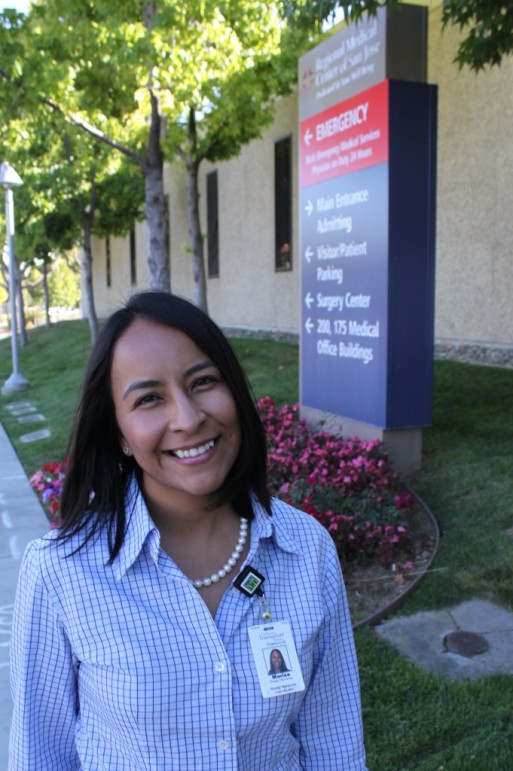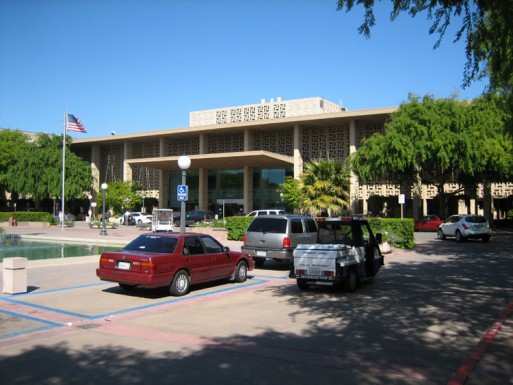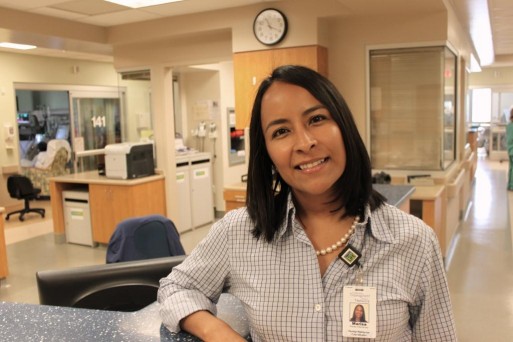Today SevenPonds speaks with Marisa Hemenez who works as a Family Care Services Educator for the California Transplant Donor Network (CTDN) in Oakland. Marisa has extensive experience in and has worked with counseling families as they deal with loved ones in crisis. In her position at CTDN, Marisa works with families who are considering organ donation.

Credit: Marisa Hemenez
Kimberly: What should families consider when they think about donating the organs of their loved ones or themselves?
Marisa: We encourage families to reflect on their own values and the values of their loved ones and make a decision based on that. If you can imagine, all of the people that we are meeting with are in acute grief, so it’s very difficult to think about anything other than the fact that your loved one has died. One of the most important donation elements is that the person who becomes an organ and a tissue donor will be treated with dignity and respect. A lot of families are worried that they may not be able to have a traditional burial or funeral process and organ and tissue donation do not prevent that.
Kimberly: How can people plan ahead to give organs?
Marisa: The easiest part of organ and tissue donation is to sign up on the registry. In California, we have a registry that can be accessed on our website called donatelifecalifornia.com. For those who don’t have the internet, the DMV will also ask people to be organ or tissue donors every time you are up for renewal for your ID or driver’s license.
You can also sign up for advance directives. Nowadays, hospitals will even give patients a POLST form that details end-of-life decisions that patients and families may wish to make before undergoing a procedure.
Kimberly: Who is able to become an organ and tissue donor?
Marisa: There is a very small percentage of people that can become organ and tissue donors. This is simply because of the type of death that is required. In order for someone to become an organ and tissue donor, that person must be on ventilated support, or life support, when they become brain-dead.
Brain-dead is another term for death. It occurs when someone is on the ventilator when they’ve lost all brain function. They will remain on the ventilator just long enough for families to say their goodbyes and make a decision for organ donation. This usually occurs when someone has a stroke or a severe head injury. It’s usually a sudden and unexpected death. What complicates this is that it may also be the result of suicide, hanging or overdose, which can be pretty traumatic. It can be a lot for families to process in addition to dealing with the organ donation process.
Kimberly: Does the age of the donor make an impact on the type of organs that are viable for donation?
Marisa: Age does affect donation, however, it really depends on an individual person. We always ask people not to rule themselves out. Oftentimes, younger donors are able to save up to eight lives through organ donation, and they can affect up to 50 people through tissue donation. There have been some donors over the age of 80, who have been able to save lives through donation. Very recently, we also had a baby who was anaphylactic, and the parents knew this and wanted to make sure that the baby was able to donate as many organs and tissue as possible. That little baby, after birth, was able to donate her heart valve to save another child’s life.
Kimberly: Is it possible to give a preference for someone you would specifically like to donate to?
Marissa: There are two processes where that can happen. The first is that, if you are making decisions for a loved one who recently passed away, you can make the decision to donate organs. If you happen to know someone who is also on the waiting list, you can make a designation to that person and they will take priority. When they are assessed, if they are a match, they will receive the organ. It’s a very delicate and complicated process because they have to be a match with blood, size, and the recipient has to be in good health.
The second type of directive donation that can occur is called the living donation. If you are in need of a kidney and you know someone else who matches you, then they can donate one of their kidneys because they only need one to live.

Credit: Wikipedia
Kimberly: Are there any special steps that someone needs to go through to see if they are a match?
Marisa: It’s very involved in the transplant hospitals and in the Bay Area we are very lucky to have more than one. There are several hospitals in the Bay Area, including UCSF, Stanford and California Pacific Medical Center. You would first have to be referred by a physician to those transplant hospitals. They will do a very thorough analysis that includes a psychological evaluation to make sure that you are physically and emotionally a match. In addition to the medical matching, there are a lot of other tests that are completed before a transplant happens.
Kimberly: Do you have any stories in particular about families that you have helped with donations?
Marisa: There are many stories that we have, and every single one takes your breath away because of these families’ generosity. One in particular that sticks in my heart is of a young couple that had only been married about a year in a half. They were both in their mid-twenties and they were having their first child. The wife gave birth, but there were complications and she had a stroke after childbirth. She was only able to take one picture with her baby. So the husband had the baby at one hospital and his wife at another hospital in a trauma center was declared brain dead. So, watching how much love that this husband had for his wife and seeing the pain he was in. But to still be able to sit and receive the information about donation, and to really think about his wife and the kind of woman she was and to make the decision to help strangers was really emotional and moving. He described her spirit and her soul and that this was the type of woman she was and he immediately said yes.

Credit: Marisa Hemenez
At a donor family gathering a year later, he and his family returned from Mexico to celebrate his wife and he brought the baby who was now one years old. He chose to keep in contact with the people who received her donation and he was able to meet his wife’s heart recipient.
Kimberly: Do you have any advice for people considering organ donation?
Marisa: When I meet with families who have talked about organ and tissue donation and end-of-life decisions prior to the death, you can tell that there is almost a sense of relief for them. The world is turned upside-down, but the one thing they are confident about is the decision that was made in life before this tragedy. I recommend that you talk to your loved ones about what your wishes are. Whether organ donation is for you or not, talk about it.
Marisa Hemenez’s 3 tips on how to approach the issue of organ donation with families
1) Acknowledge that we will all face death one way or another.
2) Know that for some families, even though donation does not take away the sorrow of the loss, it can give them hope.
3) Know that organ donation is something that all major religions support because it is considered to be the ultimate gift.
Kimberly: Are there any misconceptions about organ donation that you would like to set straight? For example, many people worry that if they are on the organ donation list, they will not get resuscitated.
Marisa: Yes, that’s a very common myth. Hospitals and organ procurement organizations like the California Donor Transplant Network are completely separate. Hospitals work to save lives and organ donor organizations are only notified once a person has reached death or is facing imminent death. So life-saving measures will not change. In fact, donation is not even contemplated until there is no hope for someone.
The second myth or concept that is difficult to understand is brain death. Brain death occurs when someone dies on the ventilator and there is no life in their brain. It’s not a coma. Brain death is irreversible. It’s very difficult for families to see because it looks like their loved ones could come back—they have a pulse, their chest is moving up and down, and yet they are brain dead.
Kimberly: Is there anything else you would like to add?
Marisa: Yes—we know that when we meet with families who have just learned of the death of their loved one that nothing in this world is going to take away that pain. Donation does not mitigate the sorrow of loss, but it can inject new meaning into a life that was thrown into chaos.
Kimberly: Thank you!
Marisa: Thank you.
Related SevenPonds Articles:
- The State of Organ Donation Today
- How Can We Open Conversations about Aging with our Elderly Parents? An Interview with Katharina Dress
- Book Review: “Stiff: The Curious Lives of Human Cadavers” by Mary Roach

 Should You Consider Organ Donation? An Interview with Marisa Hemenez
Should You Consider Organ Donation? An Interview with Marisa Hemenez


 “Songbird” by Fleetwood Mac
“Songbird” by Fleetwood Mac
 First the Wealth Gap, Now the U.S. Has a Growing Health Gap
First the Wealth Gap, Now the U.S. Has a Growing Health Gap















